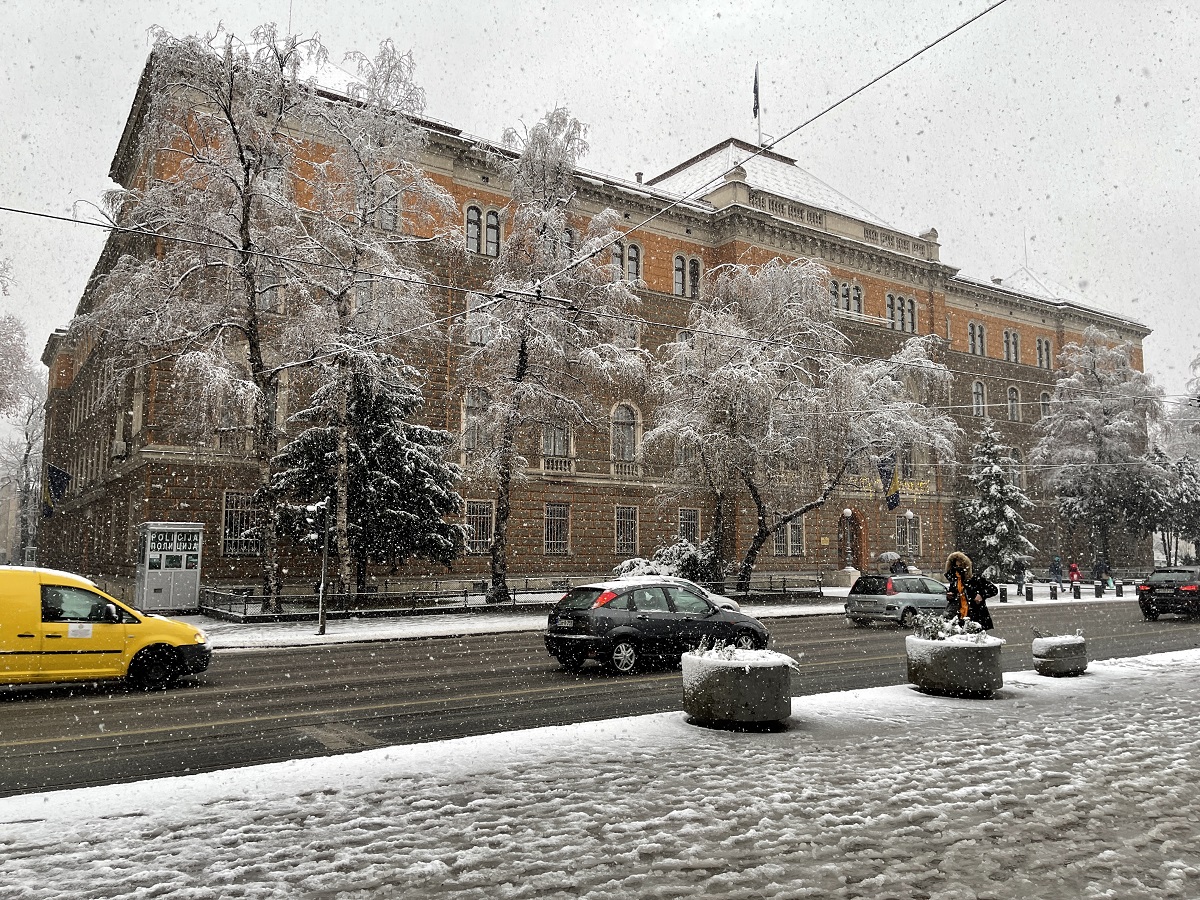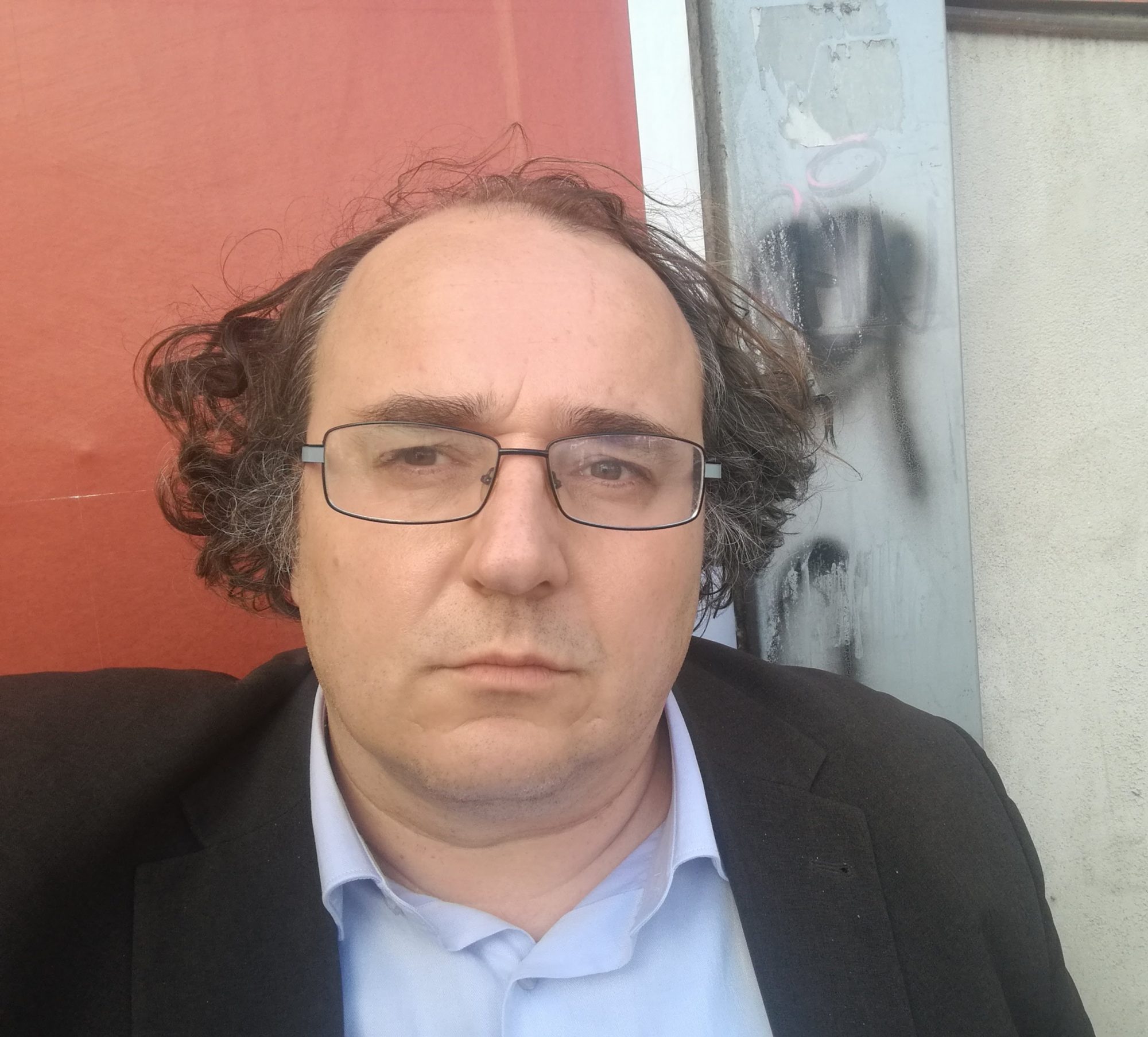Über eine Ikone
Bosnien – das ist ein Land mit dem kompliziertesten politischen System der Welt, mit drei Präsidenten, zwei ziemlich selbstständigen asymmetrischen Entitäten, mit zehn Kantonen, einem relativ selbstständigen Distrikt, mit 14 Regierungen und hunderten von Ministern, einem System also, das Stillstand, Korruption und ethnonationalistischen, von Nachbarstaaten und manchen Großmächten befeuerten Populismus begünstigt, das aber manchmal, auf eine überraschende Art und Weise, funktioniert, vor allem dann, wenn es völlig absurde aber geschichtsträchtige Vorfälle hervorbringen soll, wie letzte Woche mit dem Besuch des russischen Außenministers Lawrow geschehen.
Lawrow, dessen Land übrigens die nationalistisch-chauvinistische und separatistische Politik seines Schützlings Milorad Dodik unterstützt, eines Mitglieds des dreiköpfigen bosnischen Staatspräsidiums und des mächtigsten bosnisch-serbischen Politikers, kam anlässlich der 25 Jahre des Daytoner Friedensabkommens nach Bosnien hauptsächlich um zu verkündigen, dass sich auch in den nächsten 25 Jahren nichts ändern solle, trotz vieler Signale der designierten Biden-Regierung, eine bosnische Verfassungsreform zu fördern, die das Land funktionsfähig im Sinne einer liberalen Demokratie machen soll. Nun traf sich Lawrow zunächst nur mit Dodik in Ost-Sarajevo (einer Pseudostadt, die nach Kriegsende vor allem die ländlichen Gebiete und Berge um Sarajevo umfasst). Diese erste Begegnung fand ohne irgendwelche gesamtbosnischen Symbole statt, so dass die beiden anderen Mitglieder des Staatspräsidiums dies als einen Angriff auf die Souveränität des Landes interpretierten und beschlossen, ein geplantes offizielles Treffen mit Lawrow am darauffolgenden Tag kurzfristig abzusagen. Ein Skandal! Eine Ohrfeige für Lawrow, verkündeten die internationalen Medien. Lawrow ließ das nicht auf sich sitzen. Gazprom drehte einen Tag später „wegen technischer Probleme“, wie es hieß, die Gaszufuhr für Sarajevo zu, und gerade als alle über die möglichen Konsequenzen dieser Geschichte räsonierten, stellte sich heraus, dass die Geschichte gar nicht zu Ende ist: Von seinem Schützling, dem wichtigsten prorussischen Mann auf dem Balkan, erhielt Lawrow nämlich eine 300 hundert Jahre alte orthodoxe Ikone, die von Dodiks Medien ausführlich fotografiert wurde, einschließlich des Stempels an ihrem Sockel, der sie eindeutig als Eigentum der Republik Ukraine auswies. Die ukrainische Botschaft in Sarajevo protestierte, die Ikone sei als Kulturgut ihres Landes offenbar entwendet worden, wahrscheinlich aus dem seit 2014 von prorussischen Kräften kontrollierten Gebiet. Man müsse untersuchen, wie Dodik (etwa über serbische Freischärler in der Ostukraine?) in den Besitz dieses Gegenstandes gekommen sei. Das war dem sonst wenig zimperlichen Regime in Moskau offenbar zu viel: Schließlich will man, bei allen internationalen Problemen, die man hat, nicht auch noch mit gestohlenen Kulturgütern in Verbindung gebracht werden. Ihr Außenministerium verkündete, das Geschenk werde umgehend über diplomatische Kanäle an die bosnischen Behörden und Dodik zurückgegeben, um die Herkunft der Ikone zu klären. Während dessen hüllte sich ihr sonst medial überpräsenter Protegé Dodik in Schweigen, bis dann sein Büro verlautbarte, der Vorsitzende des bosnischen Staatspräsidiums sei von Covid19 infiziert und liege wegen Lungenentzündung im Krankenhaus. Viele interpretierten, diese Blamage sei das Ende seiner langen politischen Karriere, und womöglich eine Chance, eine neue politische Dynamik zu entfachen, die dem Land am Ende sogar nützlich sein könnte. Oder auch nicht, wer weiß.
An Icon
Bosnia has the most complicated political system in the world: three presidents, two relatively independent asymmetrical entities, ten cantons, one more or less independent district, fourteen governments and hundreds of ministers. It is a system conducive to stagnation, corruption and ethno-nationalist populism (this last further fuelled by neighbouring countries and some major powers), but it sometimes proves surprisingly effective, especially when it comes to creating absurd but historic incidents, like last week, when the Russian foreign minister Lavrov came to visit.
Lavrov came to Bosnia for the twenty-fifth anniversary of the Dayton Peace Agreement. Russia supports the nationalist, chauvinist and separatist politics of Milorad Dodik—one of the three members of the Bosnian presidency, the most powerful Bosnian Serb politician and the most important pro-Russian in the Balkans—and the main purpose of Lavrov’s visit was to announce that things in Bosnia should continue unchanged for another twenty-five years, despite strong signals that Biden’s designated cabinet is planning constitutional reform to turn Bosnia into a liberal democracy. Lavrov’s first appointment, an exclusive meeting with Russia’s protégé Dodik, was at Istočno Sarajevo, a pseudo-city created after the end of the war and consisting largely of the suburban countryside and mountains surrounding Sarajevo. The two other members of the presidency interpreted the absence of any pan-Bosnian symbols at this meeting as an attack on the nation’s sovereignty, and decided to cancel the official meeting with Lavrov that was planned for the following day. Scandal. International media spoke of a slap in Lavrov’s face. Lavrov wasn’t going to stand for that. A day later, Gazprom turned off the gas supply to Sarajevo, ‘because of technical problems’, and just as everyone was arguing about the potential consequences of the affair, it turned out that the affair was far from over. Dodik gifted Lavrov with a three-centuries-old Orthodox icon. This icon received the full attention of Dodik’s media and was photographed from every angle—complete with the seal on its base, which unequivocally identified it as the property of the Ukrainian Republic. The Ukrainian embassy in Sarajevo protested, saying that the icon, which was part of their country’s cultural heritage, had clearly been stolen, presumably from the zone that had been controlled by pro-Russian forces since 2014. Investigations must be conducted to establish how Dodik came into its possession, perhaps from insurgents in eastern Ukraine. This, it seems, was too much even for Moscow—not known for being overscrupulous. The Russians must have decided that they had enough international problems as it was, without getting involved in the theft of cultural artefacts. The foreign ministry announced that the gift would be immediately returned to Dodik and the Bosnian authorities via diplomatic channels, so that they could clarify the icon’s origins. During all this, Dodik himself, usually a permanent media presence, retreated into silence. Eventually, his office announced that he was infected with Covid-19 and had been admitted to hospital with pneumonia. Many interpreted his public humiliation as the end of his long political career—and perhaps an opportunity for some political change. Perhaps even change that would actually prove useful to the country. Or not, as the case may be.
Translation: Imogen Taylor
O jednoj ikoni
Bosna i Hercegovina je zemlja sa najkomplikovanijim političkim sistemom na svijetu – s tri predsjednika, dva prilično samostalna asimetrična entiteta, deset kantona, jednim relativno samostalnim distriktom, 14 vlada i stotinama ministara. Zemlja, dakle, sa sistemom koji omogućava stagnaciju, korupciju i etno-nacionalistički populizam, kojeg dodatno potpiruju susjedne zemlje i pokoja svjetska sila. No taj sistem ponekad iznenađujuće funkcioniše, prije svega kad treba da izrodi potpuno apsurdne historijske događaje poput prošlosedmične posjete ruskog ministra vanjskih poslova Sergeja Lavrova.
Lavrov, čija zemlja podržava nacionalističko-šovinističku i separatističku politiku svog štićenika Milorada Dodika, jednog od članova troglavog bosanskohercegovačkog državnog Predsjedništva i najmoćnijeg političara iz reda bosanskih Srba, došao je u posjetu Bosni i Hercegovini povodom 25. godišnjice Dejtonskog mirovnog sporazuma kako bi obznanio da se ništa ne treba mijenjati ni u narednih 25 godina, uprkos brojnim signalima novoizabrane Bajdenove vlade da će podržati ustavnu reformu u Bosni na osnovu koje bi zemlja postala funkcionalna u okvirima liberalne demokratije. Lavrov se ponajprije susreo s Dodikom u Istočnom Sarajevu, pseudogradu sastavljenom od ruralnih područja po brdima u okolici Sarajeva nakon završetka rata. Zajedničkih bosanskohercegovačkih simbola na ovom sastanku nije bilo, što su ostala dva člana državnog predsjedništva interpretirali kao napad na suverenost zemlje i odlučili da u zadnji čas otkažu službeni sastanak sa Lavrovom planiran za naredni dan. Skandal! I šamar Lavrovu, kako izvještavaju međunarodni mediji. Lavrov nije dozvolio da to samo tako prođe. Naredni dan je Gazprom zbog navodnih „tehničkih problema” obustavio dovod gasa Sarajevu, i dok se nagađalo o mogućim posljedicama ove priče, ispostavilo se da ona još uvijek nije gotova: Lavrov je, naime, od svog štićenika, najvažnijeg prosruskog čovjeka na Balkanu, na poklon dobio 300 godina staru pravoslavnu ikonu koju su Dodikovi mediji podrobno fotografisali, uključujući i pečat na njenom postolju koji jasno pokazuje da se radi o vlasništvu Republike Ukrajine. Ukrajinska ambasada u Sarajevu se pobunila jer se očigledno radi o otuđenoj kulturnoj baštini te zemlje, vjerovatno iz područja kojeg od 2014. kontroliraju proruske snage. Potrebno je istražiti kako je Dodik (preko srpskih dobrovoljaca u istočnoj Ukrajini?) došao u posjed tog predmeta. Ovo je inače nimalo osjetljivom režimu u Moskvi očito bilo previše: pored svih internacionalnih problema koje imaju, nije im baš bilo još i do uplitanja u aferu oko ukradenog kulturnog naslijeđa. Rusko Ministarstvo vanjskih poslova je objavilo da će poklon vratiti Dodiku i bosanskohercegovačkim državnim institucijama kako bi se razjasnilo njegovo porijeklo. Za to vrijeme se njihov štićenik Dodik, inače sveprisutan u medijima, ovio velom šutnje, sve dok njegov ured nije objavio kako je predsjedavajući državnog Predsjedništva zaražen virusom Covid-19 i da leži u bolnici zbog upale pluća. Mnogi su u ovoj blamaži vidjeli kraj njegove duge političke karijere i mogućnost da se započne nova politička dinamika koja bi zemlji čak mogla biti od koristi. Ili možda ne, ko zna.
(Sa njemačkog preveo Ismar Hačam)
Teilen












